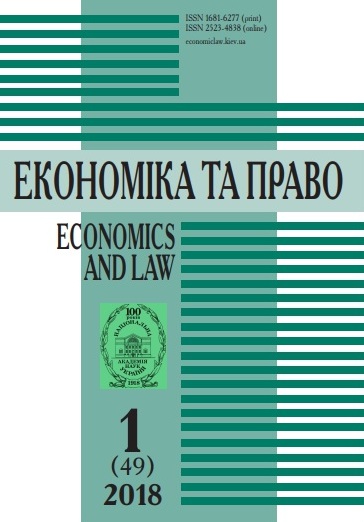COMPETENCE OF LOCAL AUTHORITIES IN THE ENVIRONMENTAL BUSINESS
DOI:
https://doi.org/10.15407/econlaw.2018.01.098Keywords:
ecological enterprise, local governments, ecological infrastructure, local ecological policy, ecological-economic functions, socio-ecological and economic developmentAbstract
The application of a comprehensive systemic approach to providing environmentally sound infrastructure in settlements for the benefit of communities is a task of local self-government bodies, on the basis of which improvement of living conditions, increase of labor productivity, health promotion, reduction of social expenditures are achieved. Environmental aspects of the local level of governance necessarily must include the functions of formation and increase of ecological culture, strengthening of ecological and spiritual traditions. Today in Ukraine there is no single approach to understanding the concept and essence of environmental business, the list of types of environmental business activity is not defined in a normative way, and many scientific points of view on this are expressed in opposite points of view. The provisions of the article specify the content of the competence of local self-government bodies separately on the issues to be decided at plenary meetings of the councils and issues that should be made to the competence of the executive bodies of the respective councils. The content of competence is defined: local governments form a local policy aimed at ensuring balanced socio-ecological and economic development of the respective territory; provide effective and ecologically safe functioning of the local economy; implement and use various tools and mechanisms for stimulating local economic development (including socio-economic development programs, clusters, national projects, mechanisms of public-private partnership); carry out measures on the development of environmental business, expansion of the scope of financial instruments for stimulating local economic development (investment subventions, development budget within the local budget, banking institutions, utility banks, municipal securities); organize and carry out work on raising the ecological culture of the population and developing ecological local lore, improving mechanisms of cooperation between state authorities, local self-government, public organizations, science and business in solving environmental problems.
References
Hrishnova O.A., Dumanska V.P. Ekolohichnyi vektor sotsialnoi vidpovidalnosti. Jekonomika i upravlenie. 2011. No. 3: 32—41 [in Ukrainian].
Sorokina H.O. Ekolohichnyi turyzm: navch. posib. Luhansk, 2013 [in Ukrainian].
Vorobiova O.A. Ekolohichnyi turyzm yak chynnyk staloho rozvytku pryrodno-zapovidnykh terytorii. Ekolohichni nauky. 2012. No. 2: 119—129 [in Ukrainian].
Darmostuk D. Tendentsii rozvytku zelenoho turyzmu v Ukraini. Teoriia ta praktyka derzhavnoho upravlinnia. 2017. No. 2 (57): 1—7 [in Ukrainian].


